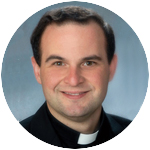
Father Eric J. Banecker
I’ve been alive for 30 years at this point. In that time, as reported recently in CatholicPhilly.com, the amount of people who attend Mass in the Archdiocese of Philadelphia on any given Sunday has decreased by about half.
Now, I can’t possibly have scared all of them away!
What happened in that time is a long litany of parish and school closures, scandals and a changing ambient culture. Perhaps more importantly, there has been widespread confusion among Catholics about what we even believe, not to mention a demographic shift in which faithful Catholics who populated cities like Philadelphia have moved or gone on to their eternal reward.
[hotblock]
In some ways, the “October Count” — though well-intentioned and perhaps necessary — is not the central question. The way we turn things around is precisely not by worrying how many people are in church. Such thinking leads to gimmicks, which never last, or to capitulation to a secular mindset, which is exactly what people find most repugnant about the recent scandals.
True transformation is much harder. It is the work of generations: person by person, family by family. We should never forget that the church was already Catholic — and, in that sense, complete — on the day of Pentecost. Jesus himself certainly interacted with large crowds, but also constituted the Twelve as his primary collaborators. This humble approach which begins with a small group of committed people is truly the only way to evangelize.
The fact is, in Philadelphia, things will probably get “worse” in terms of Sunday attendance before they get better. But we cannot wait around for more favorable winds. The Catholics who are here now need to band together and set about the work of renewal and rebuilding.
Here are a few suggestions in that endeavor:
The corporal works of mercy. Even people who dislike the church often admire her charitable work. Those who would never be caught dead in a church cannot but respect people like Mother Teresa. In the trenches, our communities need to recommit themselves to basic human outreach: to the poor, the sick, the homeless, the unemployed — to Catholics, certainly, but also to those who are not. The spiritual works of mercy are of course important, but they should come after a person has experienced the love of the church in a concrete way.
Pope Francis makes use of a visceral image on this point: when a soldier enters the field hospital with a bullet wound, the doctor doesn’t begin by checking his blood sugar. Once the basics are provided, then the spiritual works of mercy — including, of course, proclaiming the “kerygma,” or the good news of our salvation in Jesus Christ — are shown to be what they truly are: acts of love ordered to the welfare and salvation of another.
Pour resources into liturgy (including time, talent and treasure). In this case, I mean liturgy in the broadest sense: Sunday Mass, confessions, weddings, funerals, baptisms. Our communities should spend much more time preparing for such events, which are the axis on which the Church turns.
[tower]
We priests should spend more time on our homilies and hearing confessions. Budget decisions should reflect the importance of the liturgical celebrations in unifying the worshiping community and reaching those who have drifted away. One can pay large amounts of money for an outreach program in a parish, and that might be a good use of money. But it should not be spent before first investing in excellent music at the weddings and funerals.
Think about it: every week, thousands of people walk into our churches for weddings and funerals who are rarely there otherwise. We didn’t have to “do” anything to get them there. In terms of evangelization, it doesn’t get any easier than that! So why not make sure the music and liturgical experience are excellent, so excellent that they actually think about coming back on Sunday? Instead of complaining about how they don’t respond to the prayers, why don’t we instead provide top-notch music and preaching and reverent, engaging celebration?
Relational ministry. The era of big church is over. A place like Philadelphia once had to deal with massive numbers of people, mainly immigrants from Europe and their children. Most Blessed Sacrament Parish in Southwest Philadelphia once had 120 students in each classroom, with five classes of each grade. That’s mind-numbing. There were many successes that emerged from that “row-home” Catholicism, but there were also many who were profoundly wounded by their experience of the church in such places.
Regardless, the fact is that the highly institutional, almost industrial, style of church life is over in this part of the world, due as much to changing migration patterns than anything else. This is not to say that some institutions will not still be necessary: our diocese will still need a curia and parishes, our parents will still need schools where they can send their children, and social service work is often best handled in a centralized, organized way. But these structures must be transformed into vehicles for real encounter and accompaniment among Christians. They must be outward-facing, instead of self-perpetuating. The goal is the facilitation of worship of God, works of charity and the apostolate, and the proclamation of the Gospel.
No strategy, however effective, can undo decades of decay, scandal and demographic tidal waves. But quick solutions never work anyway. True reform begins with committed Christians doing not the impossible, but what they can, and doing it for God. In Philadelphia and beyond, if we seek real transformation rather than big numbers, the future can even now be better than the “glory days.”
***
Father Eric J. Banecker is parochial vicar at St. Pius X Parish in Broomall.
PREVIOUS: Seminary panelists ponder future of thinning Catholic parishes
NEXT: Decline in baptisms, marriages seen as harbinger, call to community



Share this story